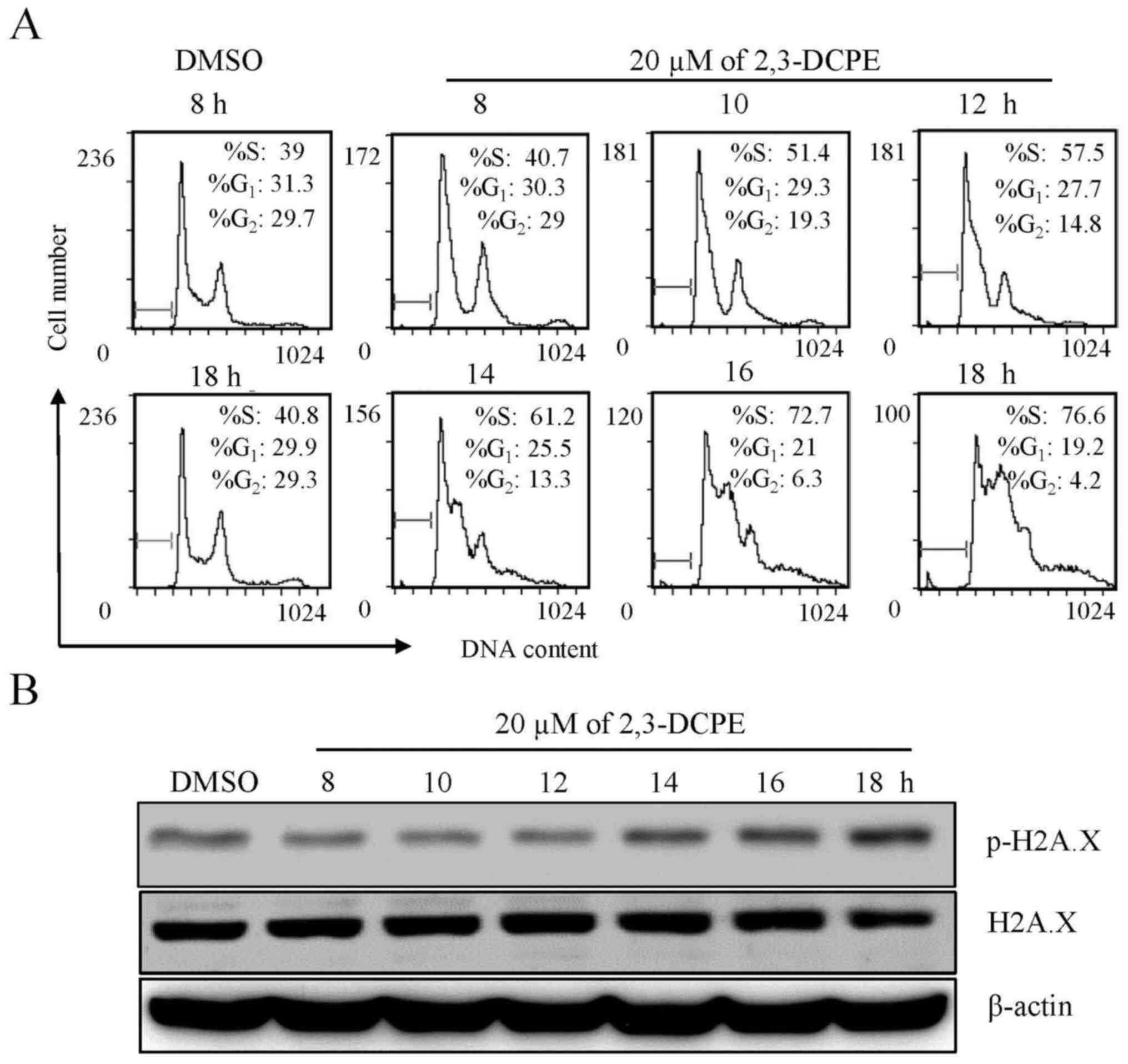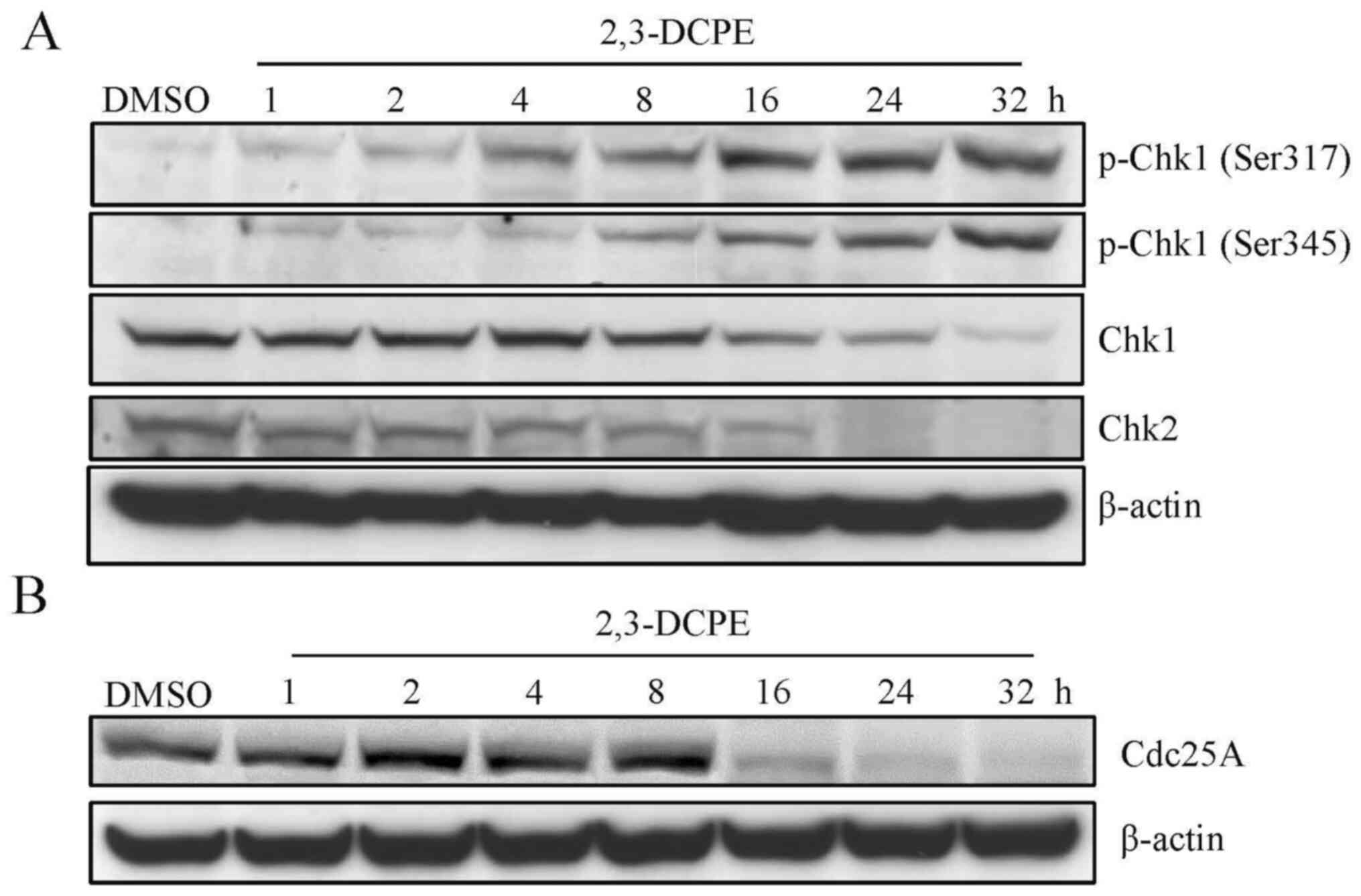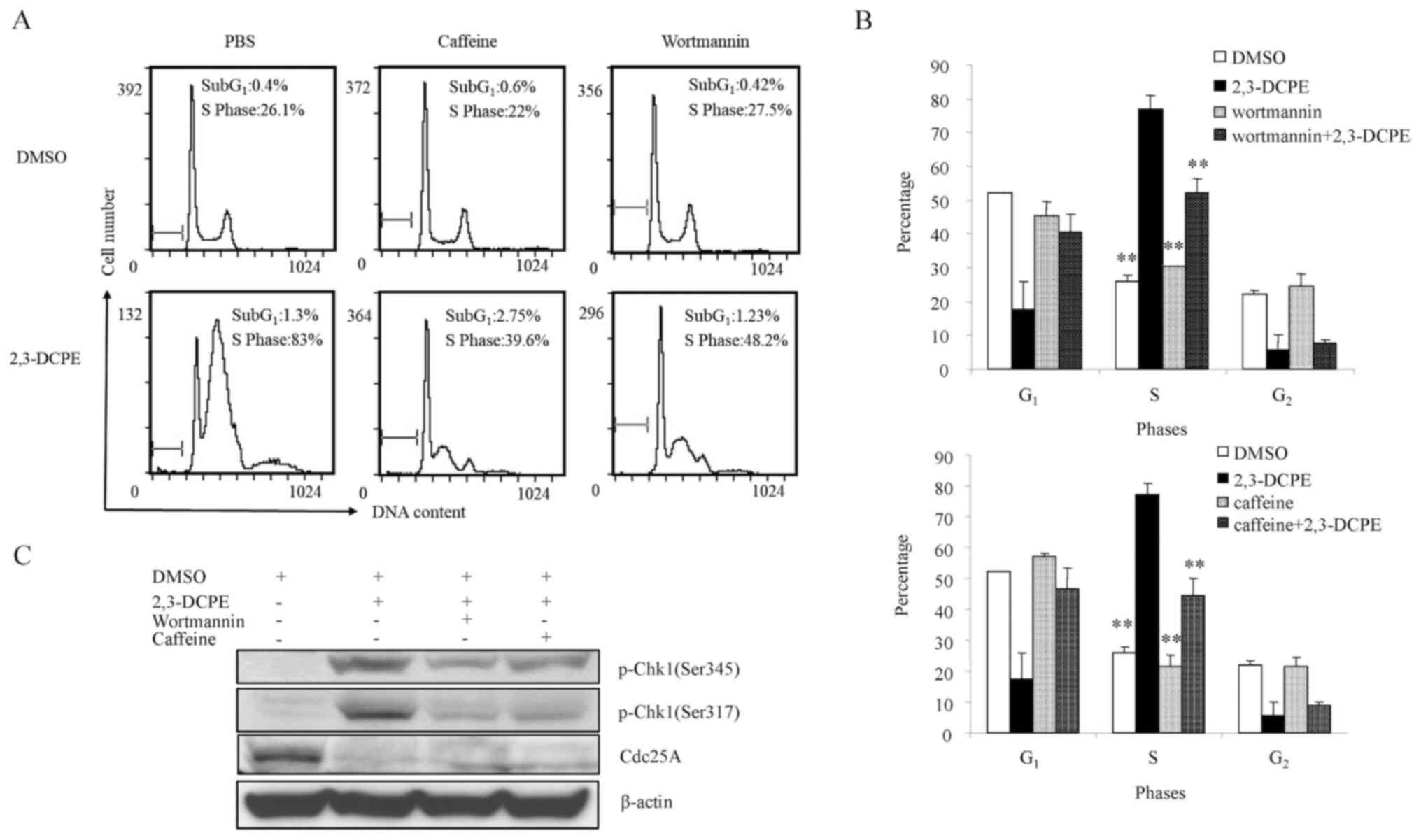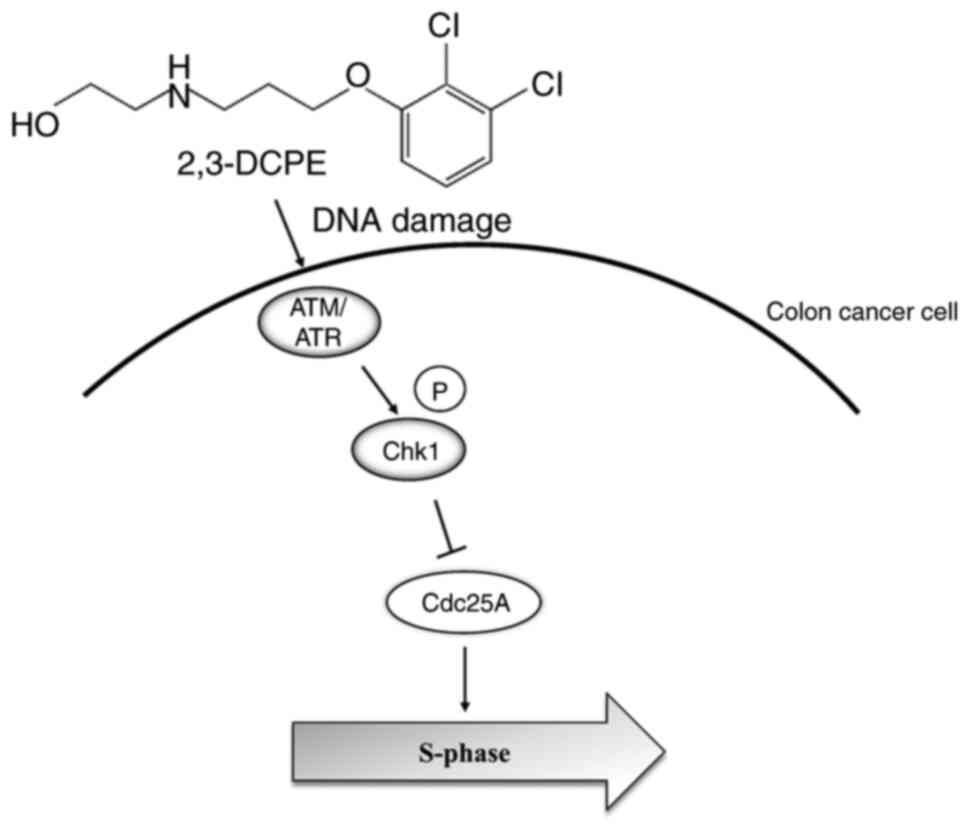|
1
|
Siegel RL, Miller KD, Goding Sauer A,
Fedewa SA, Butterly LF, Anderson JC, Cercek A, Smith RA and Jemal
A: Colorectal cancer statistics, 2020. CA Cancer J Clin.
70:145–164. 2020. View Article : Google Scholar : PubMed/NCBI
|
|
2
|
Miller KD, Nogueira L, Mariotto AB,
Rowland JH, Yabroff KR, Alfano CM, Jemal A, Kramer JL and Siegel
RL: Cancer treatment and survivorship statistics, 2019. CA Cancer J
Clin. 69:363–385. 2019. View Article : Google Scholar : PubMed/NCBI
|
|
3
|
Evan GI and Vousden KH: Proliferation,
cell cycle and apoptosis in cancer. Nature. 411:342–348. 2001.
View Article : Google Scholar : PubMed/NCBI
|
|
4
|
Van der Jeught K, Xu HC, Li YJ, Lu XB and
Ji G: Drug resistance and new therapies in colorectal cancer. World
J Gastroenterol. 24:3834–3848. 2018. View Article : Google Scholar
|
|
5
|
Vidimar V, Licona C, Cerón-Camacho R,
Guerin E, Coliat P, Venkatasamy A, Ali M, Guenot D, Le Lagadec R,
Jung AC, et al: A redox ruthenium compound directly targets PHD2
and inhibits the HIF1 pathway to reduce tumor angiogenesis
independently of p53. Cancer Lett 440–441. 145–155. 2019.
View Article : Google Scholar
|
|
6
|
Tripodi F, Dapiaggi F, Orsini F, Pagliarin
R, Sello G and Coccetti P: Synthesis and biological evaluation of
new 3-amino-2-azetidinone derivatives as anti-colorectal cancer
agents. MedChemComm. 9:843–852. 2018. View Article : Google Scholar : PubMed/NCBI
|
|
7
|
Zhu H, Zhang L, Wu S, Teraishi F, Davis
JJ, Jacob D and Fang B: Induction of S-phase arrest and p21
overexpression by a small molecule
2[[3-(2,3-dichlorophenoxy)propyl] amino]ethanol in correlation with
activation of ERK. Oncogene. 23:4984–4992. 2004. View Article : Google Scholar : PubMed/NCBI
|
|
8
|
Hartwell LH and Kastan MB: Cell cycle
control and cancer. Science. 266:1821–1828. 1994. View Article : Google Scholar : PubMed/NCBI
|
|
9
|
Mirza-Aghazadeh-Attari M, Darband SG,
Kaviani M, Mihanfar A, Aghazadeh Attari J, Yousefi B and Majidinia
M: DNA damage response and repair in colorectal cancer: Defects,
regulation and therapeutic implications. DNA Repair (Amst).
69:34–52. 2018. View Article : Google Scholar : PubMed/NCBI
|
|
10
|
Zhang B, Cui B, Du J, Shen X, Wang K, Chen
J, Xiao L, Sun C and Li Y: ATR activated by EB virus facilitates
chemotherapy resistance to cisplatin or 5-fluorouracil in human
nasopharyngeal carcinoma. Cancer Manag Res. 11:573–585. 2019.
View Article : Google Scholar : PubMed/NCBI
|
|
11
|
Liu FY, Wu YH, Zhou SJ, Deng YL, Zhang ZY,
Zhang EL and Huang ZY: Minocycline and cisplatin exert synergistic
growth suppression on hepatocellular carcinoma by inducing S phase
arrest and apoptosis. Oncol Rep. 32:835–844. 2014. View Article : Google Scholar : PubMed/NCBI
|
|
12
|
Yao J, Huang A, Zheng X, Liu T, Lin Z,
Zhang S, Yang Q, Zhang T and Ma H: 53BP1 loss induces
chemoresistance of colorectal cancer cells to 5-fluorouracil by
inhibiting the ATM-CHK2-P53 pathway. J Cancer Res Clin Oncol.
143:419–431. 2017. View Article : Google Scholar : PubMed/NCBI
|
|
13
|
Shen T and Huang S: The role of Cdc25A in
the regulation of cell proliferation and apoptosis. Anticancer
Agents Med Chem. 12:631–639. 2012. View Article : Google Scholar : PubMed/NCBI
|
|
14
|
Ciccia A and Elledge SJ: The DNA damage
response: Making it safe to play with knives. Mol Cell. 40:179–204.
2010. View Article : Google Scholar : PubMed/NCBI
|
|
15
|
Kuo LJ and Yang LX: Gamma-H2AX - a novel
biomarker for DNA double-strand breaks. In Vivo. 22:305–309.
2008.PubMed/NCBI
|
|
16
|
Zhang X, Huang Q, Wang X, Xu Y, Xu R, Han
M, Huang B, Chen A, Qiu C, Sun T, et al: Bufalin enhances
radiosensitivity of glioblastoma by suppressing mitochondrial
function and DNA damage repair. Biomed Pharmacother. 94:627–635.
2017. View Article : Google Scholar : PubMed/NCBI
|
|
17
|
Shin SY, Ahn S, Koh D and Lim Y:
p53-dependent and -independent mechanisms are involved in
(E)-1-(2-hydroxyphenyl)-3-(2-methoxynaphthalen-1-yl)prop-2-en-1-one
(HMP)-induced apoptosis in HCT116 colon cancer cells. Biochem
Biophys Res Commun. 479:913–919. 2016. View Article : Google Scholar : PubMed/NCBI
|
|
18
|
DE Wever O, Sobczak-Thépot J,
Vercoutter-Edouart AS, Michalski JC, Ouelaa-Benslama R, Stupack DG,
Bracke M, Wang JYJ, Gespach C and Emami S: Priming and potentiation
of DNA damage response by fibronectin in human colon cancer cells
and tumor-derived myofibroblasts. Int J Oncol. 39:393–400.
2011.
|
|
19
|
Solier S, Zhang YW, Ballestrero A, Pommier
Y and Zoppoli G: DNA damage response pathways and cell cycle
checkpoints in colorectal cancer: Current concepts and future
perspectives for targeted treatment. Curr Cancer Drug Targets.
12:356–371. 2012. View Article : Google Scholar : PubMed/NCBI
|
|
20
|
William-Faltaos S, Rouillard D, Lechat P
and Bastian G: Cell cycle arrest and apoptosis induced by
oxaliplatin (L-OHP) on four human cancer cell lines. Anticancer
Res. 26((3A)): 2093–2099. 2006.PubMed/NCBI
|
|
21
|
Voland C, Bord A, Péleraux A, Pénarier G,
Carrière D, Galiègue S, Cvitkovic E, Jbilo O and Casellas P:
Repression of cell cycle-related proteins by oxaliplatin but not
cisplatin in human colon cancer cells. Mol Cancer Ther.
5:2149–2157. 2006. View Article : Google Scholar : PubMed/NCBI
|
|
22
|
Fang Y, Yu H, Liang X, Xu J and Cai X:
Chk1-induced CCNB1 overexpression promotes cell proliferation and
tumor growth in human colorectal cancer. Cancer Biol Ther.
15:1268–1279. 2014. View Article : Google Scholar : PubMed/NCBI
|
|
23
|
Greenow KR, Clarke AR, Williams GT and
Jones R: Wnt-driven intestinal tumourigenesis is suppressed by Chk1
deficiency but enhanced by conditional haploinsufficiency.
Oncogene. 33:4089–4096. 2014. View Article : Google Scholar : PubMed/NCBI
|
|
24
|
Liu X, Bian C, Ren K, Jin H, Li B and Shao
RG: Lidamycin induces marked G2 cell cycle arrest in human colon
carcinoma HT-29 cells through activation of p38 MAPK pathway. Oncol
Rep. 17:597–603. 2007.PubMed/NCBI
|
|
25
|
Soule BP, Simone NL, DeGraff WG, Choudhuri
R, Cook JA and Mitchell JB: Loratadine dysregulates cell cycle
progression and enhances the effect of radiation in human tumor
cell lines. Radiat Oncol. 5:82010. View Article : Google Scholar : PubMed/NCBI
|
|
26
|
Xiao Z, Xue J, Sowin TJ, Rosenberg SH and
Zhang H: A novel mechanism of checkpoint abrogation conferred by
Chk1 downregulation. Oncogene. 24:1403–1411. 2005. View Article : Google Scholar : PubMed/NCBI
|
|
27
|
Pauklin S, Kristjuhan A, Maimets T and
Jaks V: ARF and ATM/ATR cooperate in p53-mediated apoptosis upon
oncogenic stress. Biochem Biophys Res Commun. 334:386–394. 2005.
View Article : Google Scholar : PubMed/NCBI
|
|
28
|
Wu S, Zhu H, Gu J, Zhang L, Teraishi F,
Davis JJ, Jacob DA and Fang B: Induction of apoptosis and
down-regulation of Bcl-XL in cancer cells by a novel small
molecule, 2[[3-(2,3-dichlorophenoxy)propyl]amino]ethanol. Cancer
Res. 64:1110–1113. 2004. View Article : Google Scholar : PubMed/NCBI
|
|
29
|
Carrassa L and Damia G: DNA damage
response inhibitors: Mechanisms and potential applications in
cancer therapy. Cancer Treat Rev. 60:139–151. 2017. View Article : Google Scholar : PubMed/NCBI
|



















